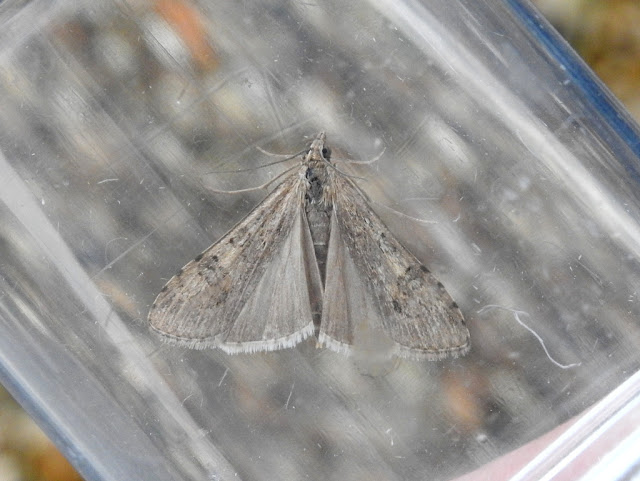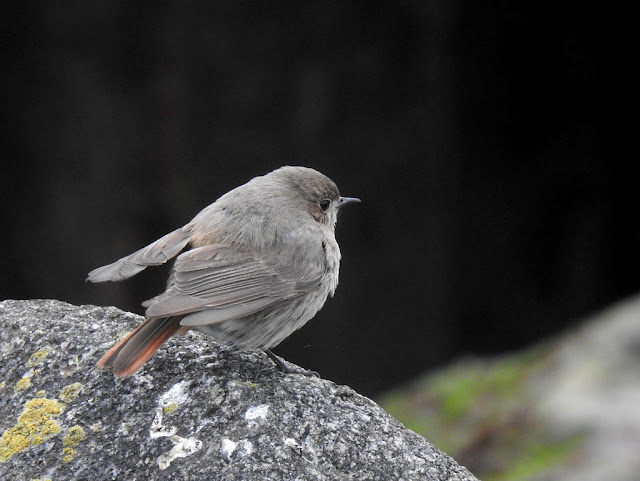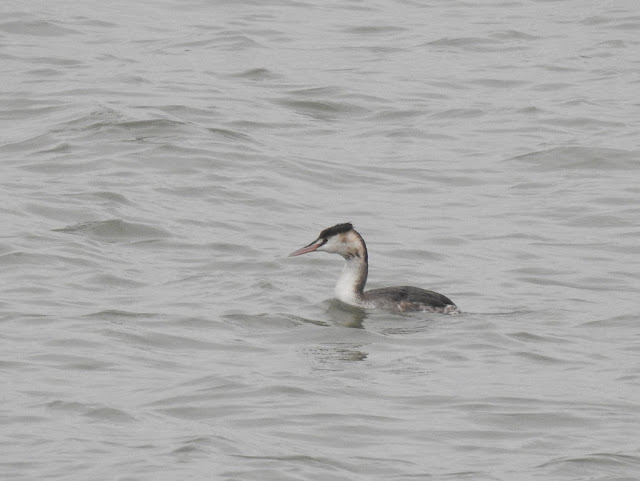I stepped outside this morning and surveyed the moth-less moth towel. The
damp, after-rain chill crept unpleasantly down my collar and I knew there
would be nothing in the trap. Just a few degrees colder than the last couple of
nights but, sure enough, zero moths. I've caught moths on seven nights since
first deploying the trap on 3rd February. The species count is now 11, plus
two aggregates, and already there have been surprises. For example, on Monday
night I caught a moth which had undoubtedly crossed the Channel very
recently...

|
Nomophila noctuella (Rush Veneer)
|
I caught quite a few of these last year, and regularly encountered them in
good numbers in grassy coastal habitat during the autumn. But they apparently
do not survive our winters, so this one is freshly arrived. A few miles east
of here, that same night produced something far more spectacular for Paul
Harris...

|
This little cracker is almost certainly from Africa.
|
I find it quite amazing that swirling wisps of Sahara dust, like the one which
gently coated our cars and wheely-bins recently, carry with them creatures
like these. The potential for scarce and rare immigrants (and associated
thrill) is undoubtedly one attraction of mothing, but I am regularly blown
away by the intricate beauty of far less exotic beasties. Tuesday night was the best so far; I
caught 14 moths of eight species, three of which were new for me...

|
Just over 1cm long, and little more than a dull smudge to the naked
eye.
|

|
Dotted Border
|

|
|
Spring Usher. What a gorgeous moth.
|
A bit of research tells me that Spring Usher is quite patchily
distributed in Dorset. An oak feeder, there is only one other Bridport area
dot on the Living Record map. Probably I am quite fortunate to have caught one.
The forecast is predicting cold nights now, and I doubt the trap will be out
again before the month's end. But it feels like I am comfortably out of the
blocks already this year. While a grand total of 34 moths doesn't sound like a lot,
one definite immigrant and five new species can't be bad for late winter.
I've had little time for birding these past few days, but we are fast approaching that time when all sorts of tricky species might give me a chance to add them to my Patchwork Challenge tally by flying past offshore. The lack of wetland habitat here means I am going to struggle with ducks and waders, and seawatching will be a crucial tactic. Trouble is, I find it hard to steel myself to it unless conditions look good. Unfortunately, that random Red-breasted Merganser or Goldeneye I seek is unlikely to be bothered by conditions, and just as likely to fly past in a flat calm. I simply need to be there. Conditions were rubbish yesterday, yet four single Common Scoters flew west in about 25 minutes - the limit of my endurance - and each could easily have been something better. My 'seawatching despite conditions' approach has already paid off, with a single Shag past recently - a scarce bird here. I shall try again tomorrow...if I can get up.
Some pics from this week...
 |
I've had to butcher the contrast etc in order to make them visible, but this whirlpool of small Mullet was in the River Brit next to Rise restaurant on Tuesday. With fish at different depths, quite possibly 300+ here.
|
 |
It might not keep still for long, but the female Black Redstart is not shy. Photographed by the slipway rocks, a favourite spot.
|
 |
And here it is again, on the slipway rocks.
|
 |
One of up to four Great Crested Grebes west of the harbour wall.
|
 |
A sinensis Cormorant in the harbour yesterday morning.
|
So. In many ways, not much. But also, riches.










No comments:
Post a Comment